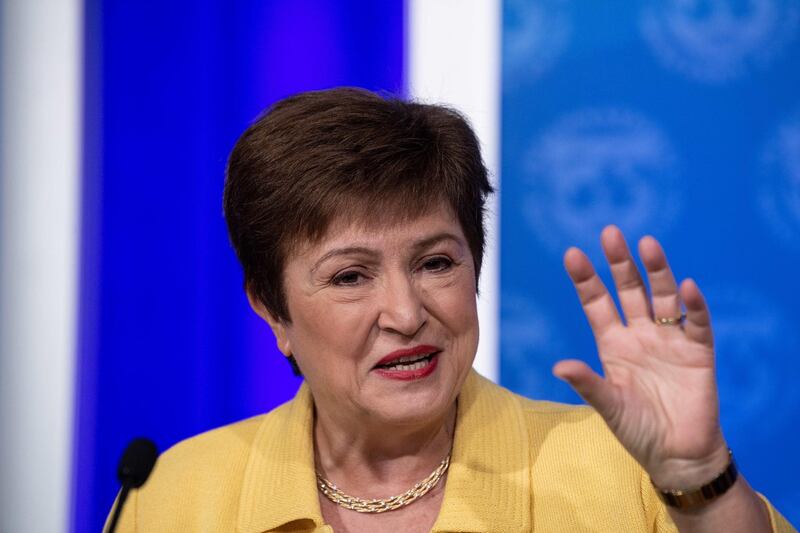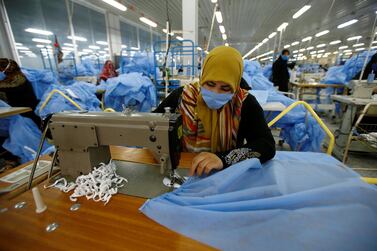The Covid-19 pandemic has had a “disproportionate” effect on women and threatens to set back their economic empowerment and widen the gender gaps that persist, the International Monetary Fund said.
The Washington lender urged policymakers to adopt measures that would limit Covid-19's "scarring effects" on women and remove legal barriers to their empowerment, the fund's managing director Kristalina Georgieva said in a blog post written with three other IMF officials and titled The Covid-19 Gender Gap.
“Well-designed policies to foster recovery can mitigate the negative effects of the crisis on women and prevent further setbacks for gender equality,” the authors said.
“What is good for women is ultimately good for addressing income inequality, economic growth and resilience.”
Last month, the IMF lowered its growth forecast for the world economy and said it would contract by 4.9 per cent this year due a more severe Covid-19 fallout.
The lender said the steep decline in economic activity had led to “a catastrophic hit” to the world’s labour market.
Women are particularly vulnerable to the health crisis because they are more likely than men to work in the sectors hardest hit by the pandemic.
These social sectors – such as retail, tourism, hospitality and services – often require face-to-face interaction.
For example, the unemployment rate of women in the US was 2 per cent higher than that of men between April and June this year.
“Because of the nature of their jobs, teleworking is not an option for many women,” the IMF officials said.
In the US, about 54 per cent of women employed in social sectors cannot work remotely, while in Brazil, the figure is 67 per cent. In low-income countries, only about 12 per cent of the population can work remotely.
Secondly, women in low-income countries rely more on informal work than men, which is often paid for in cash and has no official regulation. This leaves them with lower pay, no labour law protection and without benefits such as health insurance or pensions.
“The livelihoods of informal workers have been greatly affected by the Covid-19 crisis,” the report's authors said.
The UN estimates that the coronavirus pandemic will increase the number of people living in poverty in Latin America and the Caribbean by 15.9 million, bringing the total number of people in poverty to 214 million, many of them women and girls.
Furthermore, women often spend more time on more unpaid household work than men – about 2.7 hours per day. This means they bear the brunt of family care responsibilities resulting from coronavirus-related shutdown measures such as school closures and measures to protect senior citizens.
“After shutdown measures have been lifted, women are slower to return to full employment,” the blog said.
For example, Canada's May jobs' report showed that the employment rate of women increased by 1.1 per cent, compared to 2.4 per cent for men, as childcare issues persist.
Among parents with at least one child under the age of six, men were about three times more likely than women to return to work.
As a result, women are at a higher risk of losing human capital because of the pandemic.
In many developing countries, young girls are forced to drop out of school in order to find work and support their households.
In India, since the Covid-19 lockdown came into effect, major matrimony websites reported increases in new registrations of as much as 30 per cent as families rushed to arrange marriages to secure the future of their daughters.
“Without education, these girls suffer a permanent loss of human capital, sacrificing productivity growth and perpetuating the cycle of poverty among women,” the report's authors said.
The IMF called on policymakers to enforce measures that tackle gender inequality issues that have been compounded by the pandemic.
Authorities were urged to extend income support to the vulnerable, preserve employment linkages, provide incentives to balance work and family care responsibilities, improve access to health care and family planning, and expand support for small businesses and the self-employed.
The fund said policies must tackle gender inequality in the long term by creating conditions and incentives that encourage women to work.
This includes “gender-responsive” fiscal policies such as education and infrastructure investment, childcare subsidies and parental leave.
“These policies are not only crucial to lift constraints on women’s economic empowerment, they are necessary to promote an inclusive post-Covid-19 recovery,” the fund said.







